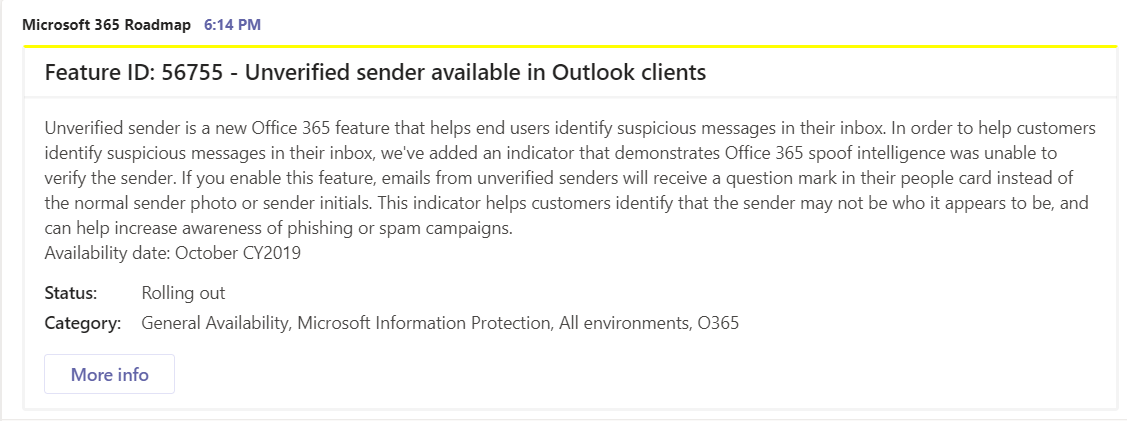This is part I of a series where the goal is to both create a reusable template as well as be able to present useful information from the Microsoft 365 Roadmap in a Teams channel.
Tools used:
- Powershell
- Message Card playground
As the roadmap URL provides an RSS feed, I can use Powershell to:
- Get data (I would like to do this once per day)
- Parse the data, select the parts I want
- Adapt the output as JSON in a supported Message Card format
- Post it in the Teams channel by using an incoming webhook
Further, I would like the message cards to be color coded based on the status of the feature:
- Red: In development
- Yellow: Rolling out
- Green: Launched
This resulted in a short script to show any updates from the roadmap in the last 24 hours.
Setup
- Set up an incoming webhook in your selected Teams channel
- Copy the URI that the connector generated (you need that later)
- Download the script from here
- Adjust the user defined variables to fit your environment, as mentioned above
- Do a dry-run to see if anything is posted. If not, try to adjust the $Hours variable to a higher value
Walkthrough
The script is pretty basic. All that is needed, is to adjust the $URI and $Hours variables.
# User defined variables
$URI = 'Teams webhook URI'
$Roadmap = 'https://www.microsoft.com/en-us/microsoft-365/RoadmapFeatureRSS'
$Hours = '24'
$Now = Get-Date
Please note that $Now variable is needed to calculate the time, so don’t change that.
To request the data, it runs an Invoke-RestMethod with the variables defined.
# Request data
$messages = (Invoke-RestMethod -Uri $Roadmap -Headers $headerParams -Method Get)
The script then:
- Goes through any new announced features and calculates if they happened within the defined timeframe (last 24 hours)
- Further it does a count of the message.category values, as we need to separate the first value from the rest
- In order to avoid a failed JSON payload, we need to convert the string to JSON before we build the payload
- Then the script will color code each entry based on state of the roadmap item
# Parse data
ForEach ($msg in $messages){
# Add updates posted last 24 hours
If (($Now - [datetime]$msg.pubDate).TotalHours -le $Hours) {
# Count, join and prepare category for use in the card
$categoryno = $msg.category.Count
$category = $msg.category[1..$categoryno] -join ", "
# Convert MessageText to JSON beforehand, if not the payload will fail.
$Message = ConvertTo-Json $msg.description
#Set the color line of the card according to the Status of the environment
if ($msg.category[0] -eq "In development")
{
$color = "ff0000"
}
else
{
if ($msg.category[0] -eq "Rolling out")
{
$color = "ffff00"
}
else
{
$color = "00cc00"
}
}
Then we use our data to create a JSON payload. I choose to create it with a here-string, adding the values and setting the color.
The message card playground is a good place to validate your JSON payload.
# Generate payload(s)
$Payload = @"
{
"@context": "https://schema.org/extensions",
"@type": "MessageCard",
"potentialAction": [
{
"@type": "OpenUri",
"name": "More info",
"targets": [
{
"os": "default",
"uri": "$($msg.Link)"
}
]
},
],
"sections": [
{
"facts": [
{
"name": "Status:",
"value": "$($msg.category[0])"
},
{
"name": "Category:",
"value": "$($category)"
}
],
"text": $($message)
}
],
"summary": "$($msg.Title)",
"themeColor": "$($color)",
"title": "Feature ID: $($msg.guid.'#text') - $($msg.Title)"
}
"@
Lastly, if there are any new updates, post them in the defined Teams channel:
# If any new posts, add to Teams
Invoke-RestMethod -uri $uri -Method Post -body $Payload -ContentType 'application/json; charset=utf-8'
- When you’re happy, set the script to run on a schedule that aligns with your $Hours variable:
- Being cloud-first, Azure automation is what I use
This script is the base for the next scripts.
Part II is available here.

